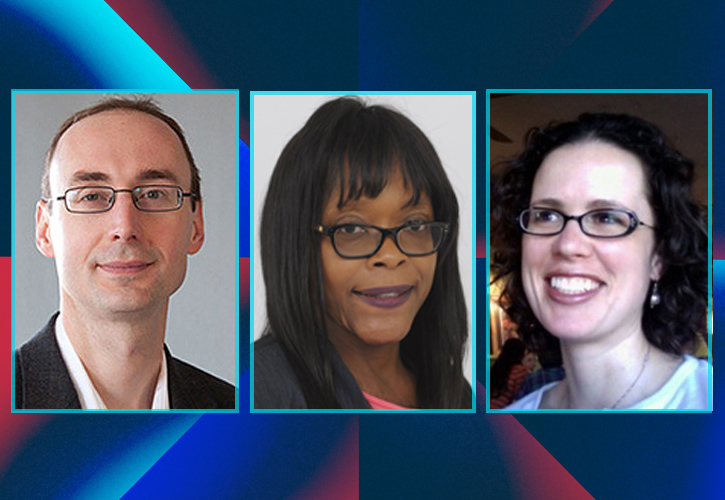College of Arts and Sciences Newsroom

University of Dayton summer undergraduate student research program pivots to remote mentorship model
By Dave Larsen
University of Dayton biochemistry major Juliano Aquilino was working to isolate a protein in the influenza virus, in hopes of providing new information on therapeutics and treatment for the flu, when he encountered problems with the solubility of the protein in water.
During a typical summer, Aquilino would tackle the issue at the laboratory bench. Instead, he explored a relatively new field of computational methods to enhance the solubility of his protein while working remotely from home in Loveland, Ohio.
“We have been working online this summer, doing literature reviews and running experiments through programs and servers to try to see what we can change or mutate in our protein. Hopefully, that will lead into physical lab work back on campus where we can solve that solubility issue,” said Aquilino, who is entering his sophomore year this fall.
Aquilino is one of 56 students in the College of Arts and Sciences Dean’s Summer Fellowship program, which provides undergraduate students an opportunity to conduct summer research in any academic discipline under the guidance of a faculty mentor. Students receive a $1,500 (full summer) or $750 (half summer) stipend as part of this fellowship.
While typically an in-person research experience, the program continued this year in a remote format because of COVID-19. Students representing 17 departments and programs from across the arts, humanities, natural sciences and social sciences are working with 36 faculty mentors on virtual versions of their projects.
Although many University programs were halted this summer because of financial concerns related to the pandemic, the Dean’s Summer Fellowship program is a high priority program supported by both gifts from alumni and donors and the College Dean’s office.
“We are blessed,” said Don Pair, College associate dean for interdisciplinary research and experiential initiatives. “We’ve had the affirmation at a programmatic level from supporters through One Day, One Dayton and earmarked contributions to the Dean’s Fund for Excellence, because they see the impact on student learning that is embodied by this kind of experiential learning opportunity.”
Pair said students and their faculty mentors responded creatively to the challenge of working together on research and artistic performance in a remote setting. However, some projects lent themselves to the virtual format better than others.
Doug Daniels, research professor of chemistry and Aquilino’s mentor, said they had to invest more time into planning and feasibility assessment, given that Aquilino couldn’t address the solubility problem in a campus laboratory.
“While our end goal I do believe is still achievable, the workflow that I had imagined to get there is not at all readily achievable,” said Daniels, executive director of the University’s Integrative Science and Engineering Center. “So, we have adapted our approach several times over the course of the summer.”
Megan Passon, a criminal justice studies and sociology double-major from Monroe, Michigan, is studying whether there is a correlation between political rhetoric and hate crimes, as well as changes in those trends from 2000 to 2020.
“It’s a research-based fellowship where the aim is to develop a project that ultimately leads to a presentation at a national conference and a publication,” said Martha Hurley, professor and Criminal Justice Studies program director, who is Passon’s mentor.
Typically, Hurley would meet almost daily during the summer with Passon to discuss literature and sources for her research. Instead, they developed a plan for the project that included a timeline and expectations. Passon submits a weekly research reflection log and the pair meets via Zoom to discuss it.
Passon said the biggest challenges have been occasional Internet outages and getting herself into the mindset to read for hours about criminal justice methodology away from a traditional academic setting.
“I love it, I’m very passionate about it, but it’s not the easiest doing it in a home environment,” said Passon, who is entering her senior year.
Barbara Drabik, a nontraditional student from Tipp City, Ohio, who is entering her second year at the University, is writing the manuscript for a historical novel under the guidance of Tereza Szeghi, associate professor of English. The novel involves the suicide of an 18-year-old woman in Drabik’s family during the 1920s and its subsequent impacts on her family.
Szeghi said the project works well in a remote format. Drabik is researching historical events and fleshing out the framework for the novel before she turns full-on to the creative writing components this fall. They meet weekly via Zoom, with Drabik submitting questions and working drafts via email.
Drabik planned to visit the Toledo Public Library this summer to do archival work in its genealogy department, but the library is closed because of COVID-19. Instead, she is working remotely with a librarian, who is providing newspaper clippings about the events.
“It will be nice when we can tangibly, physically walk into a library or on campus and be able to sit down in front of people and work one-on-one,” Drabik said. “But until then, this works for me.”
For more information, visit the Dean’s Summer Fellowship program website.
Top image (L to R): 2020 Dean's Summer Fellowship program mentors Doug Daniels, Martha Hurley and Tereza Szeghi.
